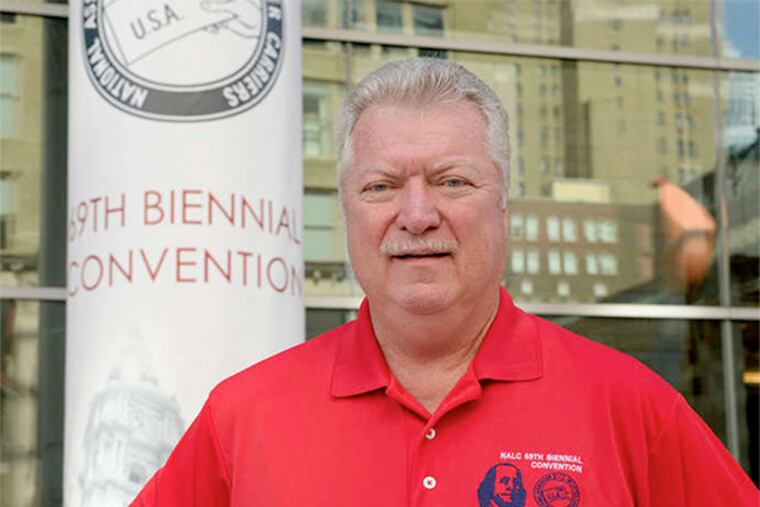Letter carriers arrive for convention with worries for future
More than 8,000 union letter carriers - members of the National Association of Letter Carriers, or NALC - will arrive in Philadelphia on Sunday for one of the city's largest conventions this year.

More than 8,000 union letter carriers - members of the National Association of Letter Carriers, or NALC - will arrive in Philadelphia on Sunday for one of the city's largest conventions this year.
They, and their families, 12,000 in all, will be everywhere. They will show up at the Convention Center in a sea of colors, with carriers wearing vests color-coded by region.
On Tuesday, 4,500 of them will occupy Citizens Bank Park to watch the Phillies take on the San Francisco Giants. And until they leave next Saturday, they are expected to generate $24.8 million in economic impact, with some of that going to pay for 28,190 hotel room nights.
For the letter carriers, the NALC convention, held every two years, is a good time to connect with friends in person.
But it's not all good times.
"This is the third convention to find a survival strategy for the postal service," said James Sauber, chief of staff for the union.
"What is interesting is that business has turned around," he said, "but the political situation is still mired in dysfunction."
Three factors have had an impact on the U.S. Postal Service in the last decade - the Internet, the recession, and a highly unusual law passed by Congress in the last moments of a tense budget debate in 2006.
These days, the union and its managers, the postal service, have begun, somewhat successfully, to grapple with the impacts of the Internet.
Because of the Internet, letter delivery is down, as people pay bills online and e-mail instead of mail. However, because people shop online, package delivery is up - by 11 percent this year. Carriers even deliver boxes from Amazon on Sunday.
Even so, added package-delivery revenue has yet to make up for losses from letter delivery.
The grip of the recession has also loosened, with the increase in commerce. In 2009, at the worst of the recession, the postal service lost $7 billion in one year.
During that year, letter carriers, on their daily routes, showed the evidence of the nation's devastating economy in their lighter-than-usual bags.
No need to carry heavy catalogs. No one was buying; no one was shipping.
These days, with the postal service adjusting to the Internet and the economy improving, what remains, management officials and union leaders agree, is an unusual burden imposed on the agency by Congress.
To balance the fiscal budget in 2006, Congress required the postal service to pre-fund 75 years of retiree medical benefits over 10 years, for about $5.6 billion a year, starting in 2007.
"That'll be $50 billion sitting up somewhere for employees who might not even be born yet," said William Lucini, who, as the head of the Philadelphia regional division of the National Association of Letter Carriers, is hosting the convention.
"That's the thing that has held us back the most," Lucini said. From his office in Philadelphia, Lucini leads 17,000 active and retired carriers in Region 12 - Pennsylvania and southern and central New Jersey.
Management and union constantly lobby Congress for relief from retiree health pre-funding. Most other business and government entities pay those expenses year by year.
Relief from retiree health pre-funding "is the largest of our proposals to Congress," said Joseph Corbett, chief financial officer of the postal service, and no relation to Pennsylvania's governor.
For example, in the first six months of the current fiscal year the postal service would have turned a billion-dollar profit - revenue from postage and shipping minus operating expenses, such as salaries.
But, the retiree health pre-funding put the postal service in the red.
"It's not truly a profit," Corbett said.
To NALC, the postal service is an agency on the move and with a bright future.
A proposal to add low-cost banking services at the vast network of post offices comes at a time when regular bank branches are closing and making banking more difficult for rural folks and the urban poor.
The Sunday package delivery for Amazon highlights the advantage, they say, of the agency's last-mile delivery system.
But, Corbett worries about 20-year-old trucks and sorting equipment that hasn't been upgraded. "We've been starving the business," he said.
Finances are important, but they won't be the only convention topic. Workshops will center on the day-to-day business of running a union. Politicians will address the group, in person or by video.
But mostly, it'll be a time for people who generally enjoy their work to enjoy one another.
"I like being outside and I like seeing the people," said Charles "Chuck" Goushian, who delivers mail in Collingswood and presides over NALC Branch 540 - 384 active and retired letter carriers in southern New Jersey.
"I've been on the same route 19 years and you see the kids grow up," he said. "When I started, they were playing on the sidewalk. Then, they are driving cars, getting married, and having kids. Now some of the older people - some of them pass away and I go to their funerals."
Yes, Goushian has fended off many a peevish pup, but did he ever have any of those X-rated encounters with bored housewives that used to be a staple of so many 1960s comedy routines?
"If I did," he said, "I wouldn't tell you."
215-854-2769
@JaneVonBergen